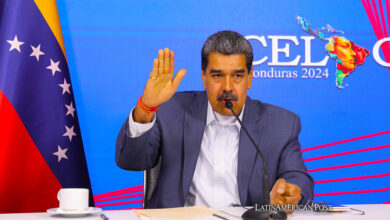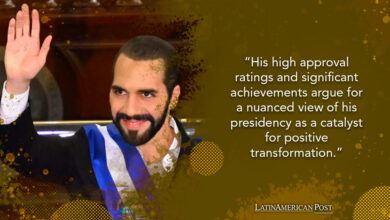El Salvador’s Bukele is Riding High on Security Success for Reelection

In a remarkable demonstration of political dominance, El Salvador’s President Nayib Bukele is on the cusp of a resounding reelection victory, propelled by his tough stance on security issues. This charismatic leader, a fervent advocate of Bitcoin and former mayor of San Salvador, has captured the nation’s imagination and challenged the norms of political engagement in Central America.
Bukele’s Unconventional Path to a Second Term
Bukele, 42, known for his dynamic and often unconventional approach to governance, temporarily stepped down from his presidential role last November to pursue a second term. This move followed a controversial decision by the Supreme Court, which interpreted Bukele’s human right to run for office as superseding the constitutional prohibition against consecutive presidential terms.
This ruling came after lawmakers from Bukele’s New Ideas Party, which commands an overwhelming majority in Congress, appointed the judges responsible for this pivotal decision.
A recent poll by Francisco Gavidia University indicates an astonishing 71% lead for Bukele over his nearest rivals, hailing from El Salvador’s traditional political parties, which now seem to be on the brink of political irrelevance, with both polling below 3%. This overwhelming support for Bukele underscores a seismic shift in the nation’s political landscape, upending the long-standing dominance of traditional parties.
Controversial Anti-Gang Campaign Defines Bukele’s Leadership
Bukele’s administration has been marked by an aggressive anti-gang campaign launched in March 2022 under emergency powers, which has led to the arrest of over 75,000 suspected gang members. This hardline approach to security has earned Bukele both acclaim and criticism. Supporters hail it as a much-needed crackdown in a nation long plagued by gang violence.
At the same time, detractors warn of an erosion of civil liberties and a slide into authoritarianism. The emergency powers have suspended certain rights, including due process and the right to a legal defense, raising alarms among human rights advocates.
Despite these concerns, Bukele’s popularity seems unscathed. The impending election, slated for February 4th, has about a fifth of the electorate undecided, with some considering abstention or submitting blank ballots. However, the poll suggests that Bukele’s New Ideas Party is poised for a sweeping victory, potentially securing 57 out of 60 legislative seats. This would further consolidate their control and significantly influence the future trajectory of El Salvador.
Populism and Pragmatism: Bukele’s Leadership Style
Bukele’s tenure has been a blend of populism and pragmatism, with his embrace of Bitcoin as legal tender being a prime example of his unorthodox methods. While celebrated by some as a bold step into the future, this move has been met with skepticism by others, including international financial institutions wary of the cryptocurrency’s volatility.
As the election approaches, El Salvador stands at a crossroads. Bukele’s presidency, emblematic of a new era in Salvadoran politics, has been both transformative and polarizing. His approach to governance – a mix of digital savvy, populist messaging, and authoritarian tendencies – has reshaped the nation’s political discourse.
Also read: Argentina’s New Leader Presents a Unique Blend of Politics and Pets
The question is whether Bukele’s impending victory will lead to more excellent stability and prosperity or if his controversial methods will prove detrimental in the long run. What is certain is that El Salvador, under Bukele’s leadership, is charting a new and uncertain course, one that will be closely watched by both its citizens and the international community.





